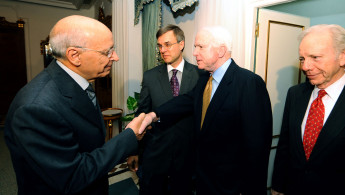Tunisia's 'moderate Islamists' extend hand to Washington
The White House seems confident about Tunisia.
It welcomed the presidential election in December 2014, won by Beji Caid Essebsi, the candidate for the secularist Nidaa Tounes - but has taken steps not to isolate other groups in the north African nation.
Although Tunisia is a small country with limited resources, it is strategically important for the US.
Most US commentators appear to agree that Tunisia will be an exception to the political turmoil currently engulfing the region.
| In the world of Tunisian politics, anyone who does not consider the important role played by the US role cannot be an effective actor. |
In early February, Republican Senator John McCain visited Tunisia and met Prime Minister Habib Essid and President Beji Caid Essebsi.
He also met Rached Ghannouchi, leader of Tunisia's moderate Islamist party Ennahdha, and other senior party figures including Ali al-Arid, who was interior minister when the US embassy in Tunisia was attacked in September 2012.
McCain's visit was political, reflecting the Republicans' belief they will return to the White House after the November 2016 US presidential elections.
During his visit, the senator discussed a proposal for a free trade agreement between the US and Tunisia, and focused on the critical security situation threatening Tunisia and its neighbours.
He reportedly spoke with Ghannouchi and other Ennahdha leaders about Tunisia being the main source of foreign fighters in Syrian and Iraq.
When Ennahdha was preparing to run for Tunisia's National Constituent Assembly, after former President Zine El Abidine Ben Ali's departure from power in January 2011, Ghannouchi was preoccupied with Washington's reaction to an Islamist victory in Tunisia.
To minimise a backlash, he visited the US to reassure decision-makers of the moderate and pro-US stance of his movement, and its willingness to follow in the footsteps of Turkey's Justice and Development Party.
As a result, many in Tunisia, especially leaders of the leftist political alliance, the Popular Front, believe the Islamists are natural allies of Washington.
However, in the world of Tunisian politics, analysts say, anyone who does not consider the important role played by the US role cannot be an effective actor.
This article is an edited translation from our Arabic edition.



